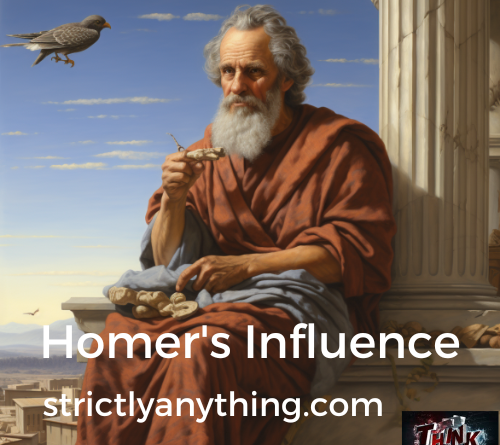Homer’s Cultural and Artistic Infuence
Homer’s Works and Influence
When we talk about ancient literature, one name that stands tall is Homer. This legendary poet from ancient Greece left an indelible mark with his two epic poems, “The Iliad” and “The Odyssey.” Written around the 8th century BCE, these works have not only entertained generations but also shaped the course of Western literature and influenced various aspects of art and culture.
Homer’s “The Iliad” is an epic poem that recounts the events of the Trojan War. Filled with powerful heroes, dramatic battles, and divine interventions, this work has captivated audiences for centuries.
Its impact on art cannot be overstated. Countless artists have been inspired by its vivid descriptions of warriors clad in armor, chariots racing across the battlefield, and gods influencing mortal affairs.
Paintings, sculptures, and even pottery have been adorned with scenes from this epic tale. Similarly, Homer’s “The Odyssey” takes readers on a thrilling journey through the adventures of Odysseus as he tries to return home after the Trojan War.
This epic has had a profound influence on literature and storytelling techniques throughout history. The concept of a hero’s journey or quest can be traced back to this narrative masterpiece.
From modern novels like James Joyce’s “Ulysses” to films like “O Brother, Where Art Thou?” directed by Joel Coen, echoes of Homer’s odyssey can be found in numerous artistic expressions. Moreover, Homer’s works have not only left their fingerprints on visual arts but also influenced other areas of culture such as theater and music.
Greek playwrights drew inspiration from both “The Iliad” and “The Odyssey,” incorporating themes from these epics into their tragedies and comedies. Even today, when we watch plays or movies based on ancient myths or historical events rooted in Greek civilization, we are indirectly experiencing Homer’s influence.
Homer’s literary contributions are immeasurable. His works, namely “The Iliad” and “The Odyssey,” have had a lasting impact on art, literature, and culture.
The detailed depictions of heroic deeds, the exploration of human nature, and the interplay between mortals and gods have inspired countless artists throughout history. Homer’s legacy continues to resonate with us today, reminding us of the power of storytelling and its ability to shape our understanding of the world.
Challenging the Status Quo
Homer’s works, such as “The Odyssey” and “The Iliad,” have had a profound impact on challenging the status quo in various ways. One of the ways in which Homer challenges the status quo is through his portrayal of women. In ancient Greek society, women were often confined to domestic roles and had limited agency.
However, Homer challenges this societal norm by depicting strong and complex female characters in his epics. For instance, in “The Odyssey,” we encounter the character of Penelope, Odysseus’ faithful wife.
Despite being faced with numerous suitors vying for her hand in marriage during Odysseus’ long absence, Penelope remains steadfast and cunning. She devises clever strategies to delay choosing a suitor while secretly waiting for her husband’s return.
Through Penelope’s resilience and intelligence, Homer challenges the perception that women are passive beings without agency. In addition to his portrayal of women, Homer also challenges societal norms through his exploration of moral ambiguity.
In both “The Iliad” and “The Odyssey,” characters are not simply depicted as entirely good or evil but rather as complex individuals with both virtues and flaws. This goes against the traditional binary understanding of morality prevalent during that time.
For instance, Achilles in “The Iliad” is a mighty warrior who fights for honor but is also driven by vengeance and pride. Similarly, Odysseus in “The Odyssey” displays both cunning intelligence and reckless behavior at times.
By presenting morally ambiguous characters, Homer challenges the notion that individuals can be easily categorized as purely good or evil based on their actions. Another way in which Homer challenges the status quo is through his exploration of themes related to fate and free will.
In ancient Greece, it was commonly believed that human destinies were predetermined by gods or other higher powers. However, Homer presents his characters with choices and decisions that influence their own fates.
For instance, in “The Odyssey,” Odysseus faces numerous obstacles and temptations during his journey home. His encounters with the Lotus-Eaters, the Cyclops, and the enchantress Circe present him with choices that ultimately shape his fate.
Homer’s exploration of free will challenges the prevailing belief that humans are mere pawns at the mercy of divine intervention. Homer’s works have been instrumental in challenging the status quo in various ways.
Through his portrayal of strong and complex female characters, exploration of moral ambiguity, and examination of themes related to fate and free will, Homer pushes against societal norms prevalent during his time. His ability to challenge established conventions through his storytelling has ensured that his influence reverberates even to this day.
Homer and Human Nature and the Soul
Homer, the legendary poet of ancient Greece, has not only left a lasting impact on literature and art but has also delved into the depths of human nature and the essence of the soul. Through his epic poems, “The Iliad” and “The Odyssey,” Homer provides profound insights into these fundamental aspects of our existence. In “The Iliad,” Homer uncovers the complexities of human nature amidst the chaos and violence of war.
He portrays heroes like Achilles and Hector, who embody contrasting qualities that reflect different facets of humanity. Achilles exemplifies fierce determination, bravery, and pride, while Hector represents honor, devotion to family, and a strong sense of duty.
Through their actions and emotions, Homer offers us a glimpse into the range of virtues and vices that reside within us all. Furthermore, in “The Odyssey,” Homer explores the transformative journey of Odysseus as he strives to return home after years spent fighting in Troy.
This epic tale not only captivates readers with its adventurous plot but also delves into the intricacies of human desires and temptations. Odysseus encounters various mythical creatures such as sirens and monsters that symbolize his internal struggles against temptation and his longing for home.
Through this narrative framework, Homer invites us to reflect upon our own desires, challenges our abilities to resist temptation, and illuminates our yearning for a place we can truly call home. Beyond his exploration of human nature in action-packed narratives, Homer also delves into philosophical questions concerning the soul’s essence.
In both epics, he introduces supernatural beings such as gods and goddesses who meddle in mortal affairs. These divine characters serve as conduits for contemplating questions about fate versus free will or pondering existential quandaries about immortality versus mortality.
Moreover, through his portrayal of heroes facing tragic dilemmas or undergoing personal growth throughout their journeys in both poems’ intricate plots—Homer invites us to question our own nature and the depths of our souls. He challenges us to consider how we confront adversity, grapple with moral choices, and seek enlightenment.
Homer’s profound influence extends far beyond his mastery of storytelling and poetic craftsmanship. In his epic poems, “The Iliad” and “The Odyssey,” he delves into the rich tapestry of human nature and explores the essence of the soul.
Through vivid characters and thought-provoking narratives, Homer offers timeless insights that continue to resonate with readers today. His works serve as a testament to the enduring relevance of exploring the complexities and mysteries that lie within ourselves—making him a true luminary in both cultural and artistic realms.
Conclusion
It is undeniable that Homer’s cultural and artistic influence has left an indelible mark on the world of literature and beyond. Through his works, such as “The Odyssey” and “The Iliad,” he challenged the status quo, delved deep into human nature and the soul, and inspired countless generations of writers, artists, and thinkers. Homer’s ability to challenge the status quo was evident in his portrayal of heroes who were flawed and complex individuals.
He humanized these mythical figures, making them relatable to readers across time. This revolutionary approach to storytelling shattered traditional notions of heroism and paved the way for a more nuanced understanding of humanity.
Moreover, Homer explored profound themes regarding human nature and the soul. Through his epics, he examined universal aspects of the human experience like love, loss, honor, and redemption.
His vivid depictions of characters’ inner struggles illuminated the intricacies of their emotions and forged a connection with readers that transcended time. Homer’s influence extended far beyond literature.
His works inspired countless artists throughout history in various mediums such as painting, sculpture, theater, music, and even film. The epic tales told by Homer ignited the imaginations of creative minds across generations who sought to capture their essence through their own artistic expressions.
In a world where art often imitates life or vice versa, Homer’s cultural impact continues to resonate profoundly today. His stories remain relevant because they address timeless aspects of the human condition – our desires for adventure and purpose; our yearnings for love and connection; our struggles with mortality; our capacity for both heroism and folly.
Through his words we are reminded that there is beauty in life’s journey; that even amidst chaos we can find moments of grace; that within each one of us lies a hero waiting to be awakened. Homer’s legacy serves as a reminder that through storytelling we can discover deeper truths about ourselves – truths that can inspire us to be better, to create, and to dream.
In embracing Homer’s cultural and artistic influence, we not only honor the genius of an ancient poet but also tap into a wellspring of wisdom that continues to enrich our lives. So let us celebrate the enduring legacy of Homer and his timeless contributions, for they have left an indelible mark on the human spirit.


